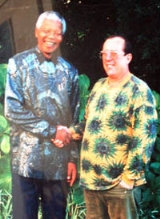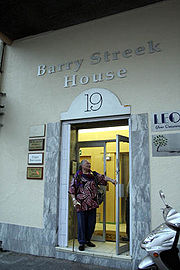
Barry Streek
Encyclopedia
Barry Streek was a South Africa
n political journalist and anti-apartheid activist.
in Kwazulu-Natal
after which he completed his national service in the South African Navy in 1966. At the time national service was mandatory for all white males of a certain age in South Africa. From 1967 to 1970 Streek studied politics and law at Rhodes University
in Grahamstown
, while contributing to the Daily Dispatch and other publications.
and was involved in many anti-apartheid activities at the university for which the then South African government later put a banning order on him. It was revealed in later years that the police special branch, with direct assistance from the university, had compiled a substantial file on Streek's anti-apartheid activities. While at Rhodes Streek also worked for the local committee of Helen Suzman
's Progressive Party
.
After graduation in 1971 Streek assumed duty as secretary-general of the National Union of South African Students in Cape Town. In July he issued a circular to the executive members of NUSAS describing the development of the post-1953 imposition of university apartheid based on a letter written for the annual student assembly in July 1968. By 1971 black tertiary students in South Africa were isolated and, some might say, offered at best a mediocre parody of a university education, on ethnically segregated campuses which deprived them of regular contact with South Africans whose ethnicity, and even mother-tongue, was different from theirs. These were the so-called 'tribal colleges'. With Streek's prompting, NUSAS was seeking to raise the awareness of its predominantly 'white' membership of the conditions under which other South Africans lived and studied while at university, a necessary strategy since students belonging to different 'population groups' were effectively barred from one another's campuses.
In 1984 he founded the Social Change Assistance Trust (SCAT), a non-profit organisation that works to assist and help develop poor rural communities in South Africa. SCAT's mission was, and still is, to assist rural communities in improving their quality of life and living standards. SCAT's focus is on human rights, gender and racial equity, as well as local economic development in the poorest communities of South Africa, which also tend to be predominantly black communities, was not popular with the apartheid government of South Africa.
. For most of this time Streek worked for South African Associated Newspapers which at the time included the Cape Times
, the Eastern Province Herald, the Rand Daily Mail, the Sunday Express, and the Sunday Times
. Streek was, at different times, chairperson, vice chairperson and president of the Cape Town Press Club. He became Parliament's media manager in 2001 before returning to the press gallery as a correspondent for the Mail & Guardian
newspaper. After which he became editor-in-chief for publishing house Jonathan Ball.

South Africa
The Republic of South Africa is a country in southern Africa. Located at the southern tip of Africa, it is divided into nine provinces, with of coastline on the Atlantic and Indian oceans...
n political journalist and anti-apartheid activist.
Early life and education
Barry Streek was educated at MichaelhouseMichaelhouse
Michaelhouse is a full boarding senior school for boys founded in 1896. It is located in the Balgowan valley in the Midlands of KwaZulu-Natal, South Africa.- History :...
in Kwazulu-Natal
KwaZulu-Natal
KwaZulu-Natal is a province of South Africa. Prior to 1994, the territory now known as KwaZulu-Natal was made up of the province of Natal and the homeland of KwaZulu....
after which he completed his national service in the South African Navy in 1966. At the time national service was mandatory for all white males of a certain age in South Africa. From 1967 to 1970 Streek studied politics and law at Rhodes University
Rhodes University
Rhodes University is a public research university located in Grahamstown in the Eastern Cape Province of South Africa, established in 1904. It is the province’s oldest university, and is one of the four universities in the province...
in Grahamstown
Grahamstown
Grahamstown is a city in the Eastern Cape Province of the Republic of South Africa and is the seat of the Makana municipality. The population of greater Grahamstown, as of 2003, was 124,758. The population of the surrounding areas, including the actual city was 41,799 of which 77.4% were black,...
, while contributing to the Daily Dispatch and other publications.
Anti-apartheid activities
At Rhodes he joined the anti-apartheid National Union of South African StudentsNational Union of South African Students
The National Union of South African Students was an important force for Liberalism in South Africa in the latter part of the last century...
and was involved in many anti-apartheid activities at the university for which the then South African government later put a banning order on him. It was revealed in later years that the police special branch, with direct assistance from the university, had compiled a substantial file on Streek's anti-apartheid activities. While at Rhodes Streek also worked for the local committee of Helen Suzman
Helen Suzman
Helen Suzman, DBE was a South African anti-apartheid activist and politician.-Biography:Helen Suzman, a life-long citizen of South Africa, was born as Helen Gavronsky in 1917 to Jewish immigrants....
's Progressive Party
Progressive Party (South Africa)
The Progressive Party was a liberal party in South Africa that opposed the ruling National Party's policies of apartheid, and championed the Rule of Law. For years its only member of parliament was Helen Suzman...
.
After graduation in 1971 Streek assumed duty as secretary-general of the National Union of South African Students in Cape Town. In July he issued a circular to the executive members of NUSAS describing the development of the post-1953 imposition of university apartheid based on a letter written for the annual student assembly in July 1968. By 1971 black tertiary students in South Africa were isolated and, some might say, offered at best a mediocre parody of a university education, on ethnically segregated campuses which deprived them of regular contact with South Africans whose ethnicity, and even mother-tongue, was different from theirs. These were the so-called 'tribal colleges'. With Streek's prompting, NUSAS was seeking to raise the awareness of its predominantly 'white' membership of the conditions under which other South Africans lived and studied while at university, a necessary strategy since students belonging to different 'population groups' were effectively barred from one another's campuses.
In 1984 he founded the Social Change Assistance Trust (SCAT), a non-profit organisation that works to assist and help develop poor rural communities in South Africa. SCAT's mission was, and still is, to assist rural communities in improving their quality of life and living standards. SCAT's focus is on human rights, gender and racial equity, as well as local economic development in the poorest communities of South Africa, which also tend to be predominantly black communities, was not popular with the apartheid government of South Africa.
Career as a Journalist
25 years of Streek's long career as a political journalist was spent in the Parliamentary Press Gallery in Cape TownCape Town
Cape Town is the second-most populous city in South Africa, and the provincial capital and primate city of the Western Cape. As the seat of the National Parliament, it is also the legislative capital of the country. It forms part of the City of Cape Town metropolitan municipality...
. For most of this time Streek worked for South African Associated Newspapers which at the time included the Cape Times
Cape Times
The Cape Times is an English language morning newspaper owned by Independent News & Media and published in Cape Town, South Africa. The first edition of the newspaper was published on 27 March 1876 by then editor Frederick York St Leger...
, the Eastern Province Herald, the Rand Daily Mail, the Sunday Express, and the Sunday Times
The Sunday Times (South Africa)
The Sunday Times is a popular South African Sunday newspaper. It has an audited circulation of 504,000 and a weekly readership of 3.2 million, making it the largest weekly newspaper in South Africa. Recently it was involved in exposing a corruption scandal involving the South African government's...
. Streek was, at different times, chairperson, vice chairperson and president of the Cape Town Press Club. He became Parliament's media manager in 2001 before returning to the press gallery as a correspondent for the Mail & Guardian
Mail & Guardian
The Mail & Guardian is a South African weekly newspaper, published by M&G Media in Johannesburg, South Africa, with a strong focus on politics, government, the environment, civil society and business.- The Mail & Guardian newspaper :...
newspaper. After which he became editor-in-chief for publishing house Jonathan Ball.
Death
He died after an 18 month battle with brain cancer in 2006. In March 2006 SCAT renamed SCAT House, the organisation's head quarters in Cape Town city center, Barry Streek House and initiated a series of awards in honour of him. The Cape Town Press Club initiated a scholarship for people from previously disadvantaged backgrounds to study journalism at Rhodes University.

